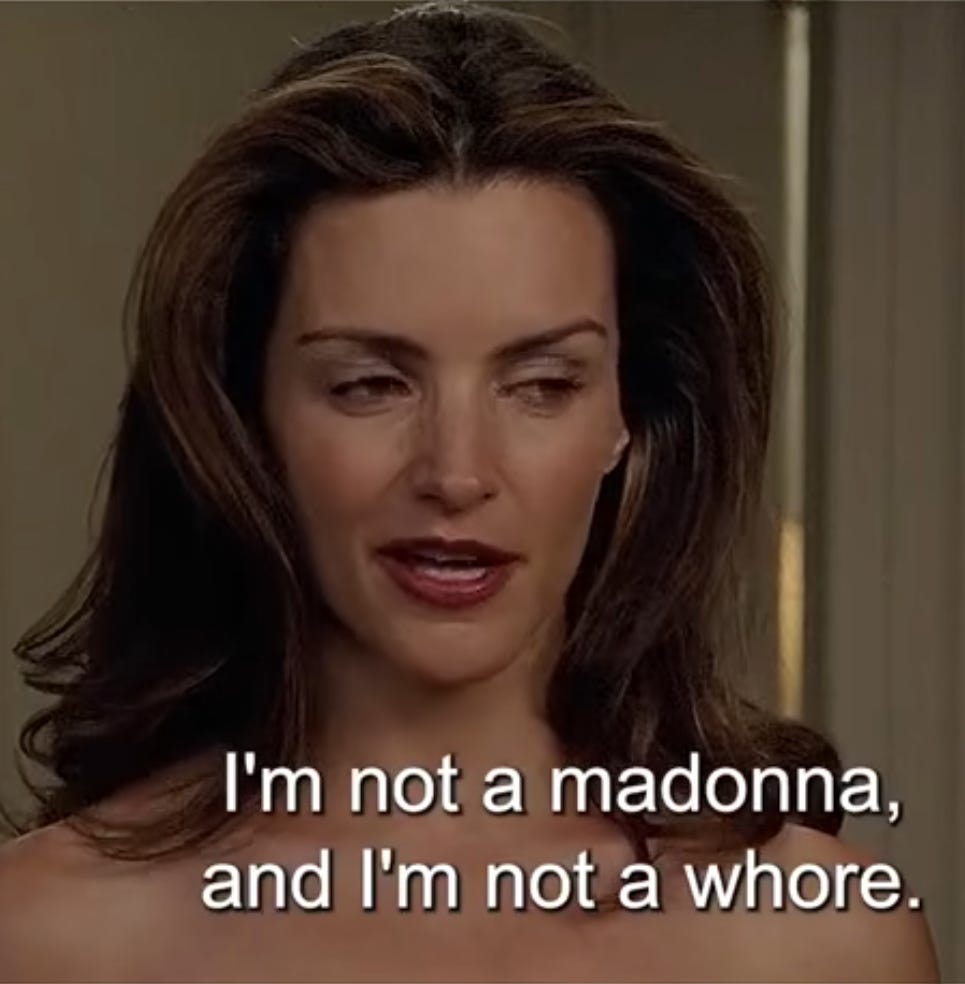This is not a roving article. I seem drawn to writing about my life when I am in motion and about society when I am at my tiny, messy desk, living my dull, boring life in Brussels. For months, I have been unable to stop thinking about a French lady—or, better yet, a French Madame. It has been weeks since I procrastinated on this article. These cheap therapy videos on YouTube have taught me something: procrastination is tied to feelings we cannot process. Bingo. It is extremely uncomfortable to write about Madame Pélicot, a rather anonymous, minute ex-secretary and 72-year-old lady who moved to the South of France to enjoy her well-deserved retirement. I always knew women could be extraordinary; they give life to other human beings. Literally, they are creators. But to see a small woman giving birth to a giant within herself, and perhaps to a new society, is miracle material to me.
It is not the first time I have been obsessed with a French woman. The first time was when I was a teenager. I remember reading about another French Madame, one that I found insufferable. Looking back, I think this was a case of “we are disturbed the most by people who display traits we have not resolved within ourselves,” one of those phrases we all quote Freud with when we are having deep conversations half-drunk with friends. I could not bear that character, yet I kept thinking about that book for months. I subconsciously realised she was more than a literary invention; she had the power to be a female archetype. She represented progress in the discourse around womanhood. What do I mean by progress, you might be thinking. Because that novel was about a bored girl who had romanticised life to an unbearable extent. Progress around women, for me, is simply telling the truth about their lived experiences and portraying women also as villains. Depicting them as the 360-degree individuals they are. I was 16 back then and could not put a name to my feelings but was confronted with this realization. That Madame was Madame Bovary.
Now, those who know me well also know that I don't have a great liking for French women. But I must confess I am grateful to them. Try living for a year with an ever-complaining spoilt brat from Paris, and you will understand where I am coming from. I also find their fashion style boring as hell. Their concern about being skinny in a country that offers the best bread on earth is annoying. I also believe their pretense about having that perfect shape and flawless skin is disingenuous when it is actually built on hours of Pilates and the equivalent of Nicaragua’s GDP in creams. And before you come at me, despite you being over 18 and able to vote and since you have not learnt not to take everything personally, just to let you know, I understand it is impossible to generalize; I will never be able to meet all the French women in this world. But I have met exceptions.
The truth is that the French women I have encountered in my life have made me feel extremely provincial and, therefore, uncomfortable. I remember eavesdropping on some of them in a group, discussing how they’d stop breastfeeding after six months to retain their perky breasts. That was shocking to me, as I am used to mothers who would dedicate themselves entirely to their kids, with their breasts being the last concern. I come from a country that respects women in their roles as sisters, mothers, and wives—but especially as mothers. Not in their being women as such.
I recall my surprise at the debate over the appropriateness of breastfeeding in public. I have always observed mothers in my home country discreetly pop out their breasts whenever necessary, feeding their babies while those around them didn’t even flinch and completely ignored them until their child was satiated. So, previously, I had no issues conceptualizing women as mothers. Perhaps it was difficult for me to envision them as women trying to balance the self-interest of looking good with the natural needs of their child for breast milk.
Years ago, I witnessed a group of French girls dressed as if they were going to an afternoon tea at the oratory, completely dominating the dancefloor and attracting all the models present as if nothing had happened. I am fascinated by their ability to be both provocative and seemingly innocent at the same time. I am not capable of that; I’d make a scene. Yet, I remember being there, wearing 12 cm heels and leather pants, still unable to seduce because I struggled to accept my own desire to seduce in the first place. That is a special talent: being provocative while maintaining respectability. They have mastered it.
French women have taught their men how to please them. They are not prudes; they know what they like and are not afraid to ask men to fulfill those desires. Italian men often say, “Oh, the French are all gay.” No, Mario. French men have had to deal with women who do not pretend to be Madonnas so that you don’t start thinking, “OMG, my woman enjoys sex too much. She isn’t like my mother; she’s a whore, and I will probably not be enough to satisfy her.” Italian men like their Madonna (wife) and their whore (lover) to be different people. It has not occurred to them that a woman can be neither or both. So, if you have a French man in your life with whom you are intimate, know now that you owe French women some gratitude. They seem to have less patience for coddling their men’s fragile egos.
I digress; I am writing silly things and making low-brow jokes once again because this is how I cope with uncomfortable feelings. But what I want to say is that, once again, women will owe something positive to a French woman. This time it is an unwilling heroine who decided to make the rape trial against her husband and 51 of 72 men public. After 50 years of a marriage that looked perfect to everyone—including themselves—she discovered that her husband, Dominique, was arrested on September 12, 2020, after being caught upskirting women at a supermarket. Following his arrest, he was released on bail while authorities investigated his digital devices. The investigation revealed his involvement in a private chatroom called "à son insu," where members discussed committing sexual acts on women without consent, often involving drugs. This chatroom was linked to over 23,000 criminal cases in France and was shut down in June 2024.
Evidence uncovered on a USB stick included more than 20,000 images and videos of his unconscious wife, Madame Pelicot, being raped, revealing 92 separate incidents involving 72 different men between July 2011 and October 2020. He was then re-arrested on November 2, 2020, on multiple charges, including aggravated rape and drugging. He confessed to drugging his wife, Gisèle Pelicot, with lorazepam to facilitate the abuse, which he recorded and shared online. She had started taking an anxiolytic, and he took the opportunity to add those drugs to her prescriptions. Despite her health deteriorating due to the abuse, Gisèle was often accompanied by her husband/abuser during medical visits, which prevented doctors from identifying her situation.
Why has this case been in my mind for weeks?
There is no one size fits all identikit of a rapist
I am a huge fan of Rob Henderson’s work on elitism and classism. Despite being a fierce anti-communist, I believe that Marx had valuable perspectives on the main motivations behind human behaviour. Of course, he missed the point in several cases, but I will not venture into that now. What I want to say is that our desire for status guides our behaviours more than we realise. We tend to think that people who enjoy a good status also have a higher moral ground. There’s a Calvinist instinct within each of us, it seems.
Guess what, though? The 72 men involved in this rape case came from all sorts of social and racial backgrounds, ages, and professions. This is hard to accept because it makes us feel unsafe. Complexity puts us in danger. The danger becomes more impalpable. In this case, the danger is even more evident as the person who started the raping was not a complete stranger who followed her at night walking in the street. It was someone who vowed to love her for life.
Victims need to be irreproachable to be trusted
When Dominique Pélicot was asked why he did what he did, he spoke about a difficult childhood. The official line of defense he used is that he is affected by a split personality caused by abuse perpetrated on him when he was a child by a nurse. He claimed to love his wife and stated that she had been a great spouse to him. However, what struck me is that he said it was precisely because of the videos and documentation he collected that she was able to hold that trial against him.
This is not a mere detail; it is true. Despite the video evidence, Madame Pélicot was still asked whether she was conscious in a video where she was holding a sex toy. She wasn’t; she was clearly sedated. But they still asked. She was also questioned about her sexual preferences and her “kinks,” if any. There had been an infidelity from her side long ago, which he had forgiven and reciprocated for a while with other women. Still, this case is significant because Madame Pélicot is an irreproachable victim. She was not a “sex worker,” nor was she someone dressed skimpy who was “asking for it.” As Madame Pélicot said herself, she could have been the grandmother of some of them.
Imagine how hard it is to prove you’re a victim in other cases when it's already difficult to accept you’ve been victimized in the first place. The shame Madame Pélicot spoke about has often been misplaced. The victim carried it.
Rape also exists within the perimeters of a relationship
I once had a conversation with some beach umbrella neighbours about rape. Because for the life of me, I have always been the one who needs to hit you with the deepest and heaviest conversation in the most improbable setting. We were discussing a case of a lady who had left her husband because he would rape her. The guys looked surprised. “How can it be rape when it is your husband?”. To me, their disbelief was shocking. Like speaking to a flat-earth conspiracy believer. I had missed the point that being a wife means never saying no to sex. And I felt so disgusted, to be honest, that I wanted to dress up. Suddenly, being in a bikini in front of them made me feel uncomfortable.
Again, one of the motivations Dominique Pélicot gave for doing what he did was “I could perform on her things she did not allow me to do in bed when conscious, like anal sex”. His partners-in-crime repeatedly declared that they never questioned whether there was something weird about that situation because “her husband was there”. “It is her husband who should have protected her”. The assumption is that the wife is a sort of belonging to the husband.
This year, I encountered the work of TheSlumflower - Chidera Eggerue. She is a British Nigerian girl who defines herself as a financial dominatrix. I have started conversations around what she says with friends, and each time I say, “There is this girl who is a dominatrix who says this or that”, my friends take what I am about to say less seriously. Yet, it had been years since I didn’t listen to someone so articulate and with a brisk logic. I tend not to give a damn about WHO says something; I am too busy listening to WHAT they say. I appreciate her because she provokes my thoughts and challenges my thinking. While I do not agree at all with her stance that sex work is just work, I cannot deny that when last month she said something along the lines of “marriage is the lowest paid form of sex work”, I was puzzled. And I still am. Marriage is far more transactional than I want to admit. It seems like men expect sex, something that should be granted once one is married. My perspective is that of a Christian believer. Love to me is and should be a communion. But I cannot deny that from the stories of violence we hear, there is little to no love. There is power plays.
I think it will take me another article to discuss her perspective because it is a fascinating one, albeit I not always agree with her. I respect her freedom and frankness though. And I will be frank too in saying that I do not know how to finish this article, I do not know what was my main take away from Madame Pélicot’s tragegy. I do not know where do we go from here. I only know that I wish her case was discussed in schools, that it would spark debates at dinner table, that it would propel us in the kind of vulnerable conversations that seem so uncomfortable and yet always end up improving us. “Not all men”, it is factual, but let’s not have a fact prevent us from looking at another fact”one too many women suffer at the hand of someone who is supposed to love them”.
Vilma Djala








Brilliant, as usual.
❤️